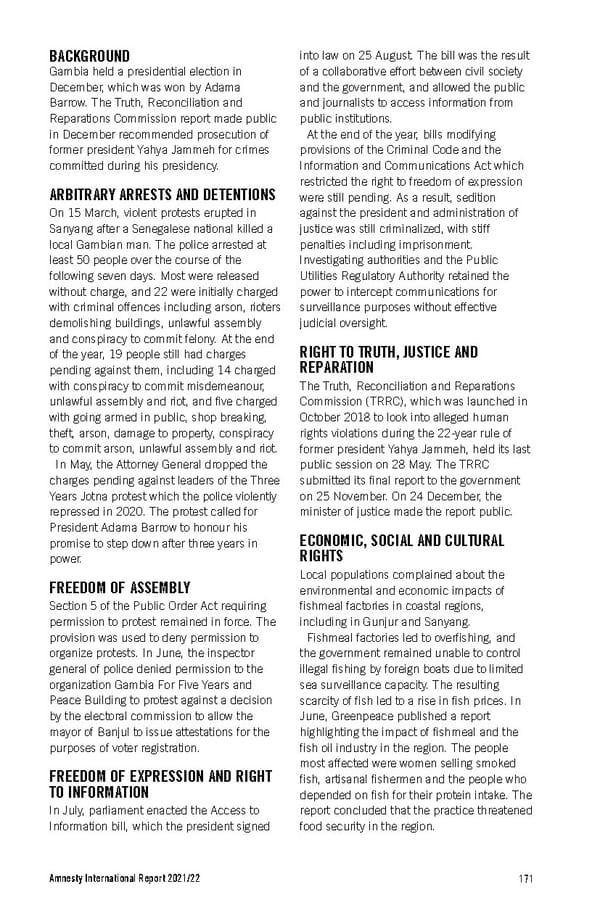BACKGROUND into law on 25 August. The bill was the result Gambia held a presidential election in of a collaborative effort between civil society December, which was won by Adama and the government, and allowed the public Barrow. The Truth, Reconciliation and and journalists to access information from Reparations Commission report made public public institutions. in December recommended prosecution of At the end of the year, bills modifying former president Yahya Jammeh for crimes provisions of the Criminal Code and the committed during his presidency. Information and Communications Act which ARBITRARY ARRESTS AND DETENTIONS restricted the right to freedom of expression were still pending. As a result, sedition On 15 March, violent protests erupted in against the president and administration of Sanyang after a Senegalese national killed a justice was still criminalized, with stiff local Gambian man. The police arrested at penalties including imprisonment. least 50 people over the course of the Investigating authorities and the Public following seven days. Most were released Utilities Regulatory Authority retained the without charge, and 22 were initially charged power to intercept communications for with criminal offences including arson, rioters surveillance purposes without effective demolishing buildings, unlawful assembly judicial oversight. and conspiracy to commit felony. At the end RIGHT TO TRUTH, JUSTICE AND of the year, 19 people still had charges REPARATION pending against them, including 14 charged with conspiracy to commit misdemeanour, The Truth, Reconciliation and Reparations unlawful assembly and riot, and five charged Commission (TRRC), which was launched in with going armed in public, shop breaking, October 2018 to look into alleged human theft, arson, damage to property, conspiracy rights violations during the 22-year rule of to commit arson, unlawful assembly and riot. former president Yahya Jammeh, held its last In May, the Attorney General dropped the public session on 28 May. The TRRC charges pending against leaders of the Three submitted its final report to the government Years Jotna protest which the police violently on 25 November. On 24 December, the repressed in 2020. The protest called for minister of justice made the report public. President Adama Barrow to honour his ECONOMIC, SOCIAL AND CULTURAL promise to step down after three years in RIGHTS power. FREEDOM OF ASSEMBLY Local populations complained about the environmental and economic impacts of Section 5 of the Public Order Act requiring fishmeal factories in coastal regions, permission to protest remained in force. The including in Gunjur and Sanyang. provision was used to deny permission to Fishmeal factories led to overfishing, and organize protests. In June, the inspector the government remained unable to control general of police denied permission to the illegal fishing by foreign boats due to limited organization Gambia For Five Years and sea surveillance capacity. The resulting Peace Building to protest against a decision scarcity of fish led to a rise in fish prices. In by the electoral commission to allow the June, Greenpeace published a report mayor of Banjul to issue attestations for the highlighting the impact of fishmeal and the purposes of voter registration. fish oil industry in the region. The people FREEDOM OF EXPRESSION AND RIGHT most affected were women selling smoked TO INFORMATION fish, artisanal fishermen and the people who depended on fish for their protein intake. The In July, parliament enacted the Access to report concluded that the practice threatened Information bill, which the president signed food security in the region. Amnesty International Report 2021/22 171
 Amnesty International Report 2021/22 Page 170 Page 172
Amnesty International Report 2021/22 Page 170 Page 172